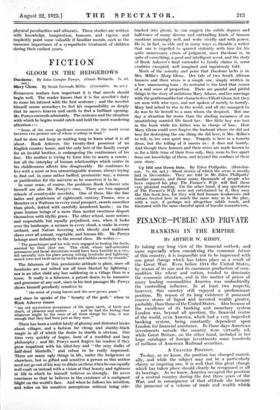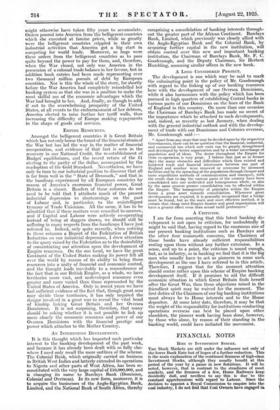FINANCE-PUBLIC AND PRIVATE
BANKING IN THE EMPIRE
BY ARTHUR W. KIDDY.
Iri taking any 'long view of the financial outlook, and more especially when considering the economic future of this country, it is impossible not to be impressed with one great change which has taken place as a result of the Great War. Even before 1914 the United States,' by reason of its size and its enormous production of corn- modities like wheat and cotton, tended to dominate the economic situation, and in the matter of prices of many leading commodities America was undoubtedly the controlling influence. In at least two respects, however, this country still enjoyed a predominant position. By reason of its long existence it possessed reserve stores of liquid and invested wealth greater; probably, than those of the United States. Also because of the excellence of its banking and monetary system London was, beyond all question, the financial centre of the world, even America, which had a very imperfect banking system, being constantly dependent upon London for financial assistance. In those days American investments outside the country were virtually nil, while Great Britain, on the other hand, included in her huge catalogue of foreign investments some hundreds of millions of American Railroad securities.
A CHANGED POSITION.
To-day, as we know, the position has changed materi- ally, and while the subject may not be a particularly cheery or inspiring one, it is well that this great change Which has taken place should clearly be recognized in all its bearings. As we know, Ametica occupied the position of a neutral country during the first three years of the War,• 'and. in consequence of • that attitude she became the 'possessor' of 'a volume of 'trade and wealth which might otherwise have taken fifty years to accumulate. Orders poured into America from the belligerent countries which she executed at famine prices, while so greatly were the belligerent countries crippled in their own industrial activities that America got a big start in competing for world trade. Moreover, so huge were these orders from the belligerent countries as to pass quite beyond the power to pay for them, and, therefore, when the War closed, not only was America in the possession of a colossal trade balance in her favour, but in addition book entries had been made representing over two thousand million pounds of debt by European countries. Nor is this the whole of the story, for shortly before the War America had completely remodelled her banking system so that she was in a position to make the most skilful use of the economic advantages which the War had brought to her. And, finally, as though to add, if not to the overwhelming prosperity of the United States, at all events to the embarrassment of her debtors, America elected to raise further her tariff walls, thus increasing the difficulty of Europe making repayments in the shape of goods and services.
EMPIRE RESOURCES.
Amongst the belligerent countries it is Great Britain which has not only borne the brunt of the financial strain of the War but has led the way in the matter of financial recuperation, and evidence of that fact is seen in the recovery in our National Credit, the re-establishment of Budget equilibriums, and the recent return of the Ll sterling to the parity of the dollar, accompanied by the readoption of the Gold Standard. Nevertheless, we have only to turn to our industrial position to discover that all is far from well in the " State of Denmark," and that in the handicap experienced by all European countries by reason of America's enormous financial power, Great Britain is a sharer. Readers of these columns do not need to be told that I attribute much of the present industrial depression to shortcomings on the part of Labour and, in particular, to the unintelligent tyranny of Trade Unionism. All the same, it has to be admitted that if these matters were remedied to-morrow, and if Capital and Labour were actively co-operating instead of being at daggers drawn, we should still be suffering in many respects from the handicaps I have just referred to. Indeed, only quite recently, when noticing in these columns a Report of the Federation of British Industries on our industrial depression, I drew attention to the query raised by the Federation as to the desirability of concentrating our attention upon the development of- Empire resources. On the one hand, we have the great Continent of the United States making its power felt all over the world by reason of its ability to bring those, resources into a unity of financial and economic control, and the thought leads inevitably to a remembrance of the fact that in our British Empire, as a whole, we have territories more vast, and undeveloped resources even greater and more varied than those represented by the United States of America. Only in recent years we have had sufficient evidence of the fact that, though great seas May divide these territories, it has only required the danger invols ed in a great war to reveal the vital bond of kinship linking Great Britain and her Oversea Dominions. It is not surprising, therefore, that many should be asking whether it is not possible to link up more closely the economic resources and power of our Oversea Dominions with the financial prestige and power which attaches to the Mother Country.
AN INTERESTING DEVELOPMENT.
It is this thought which has imparted such particular interest to the banking development of the past week, and because it has already been dealt with so fully else- where I need only recall the mere outlines of the scheme. The Colonial Bank, which originally carried on business in British West Indies and latterly extended its operations to Nigeria and other parts of West Africa, has been re- constituted with the very large capital of £10,000,000, and is changing its name to Barclays Bank (Dominion, Colonial and Overseas). In its new form, moreover, it is to acquire the businesses of the Anglo-Egyptian. Bank, Limited, and the National Bank of South Africa, thereby comprising a consolidation of banking interests through- out the greater part of the African Continent. Barclays Bank, Limited, which previously was closely allied with the Anglo-Egyptian Bank and the Colonial Bank, by acquiring further capital in the new institution, will obtain control over this new and important banking institution, the Chairman of Barclays Bank, Mr. F. C. Goodenough, and the Deputy Chairman, Sir Herbert Hambling, assuming similar offices in the new bank.
A LONG CONSIDERED PROJECT.
The development is one which may be said to mark the culminating point in the policy of Mr. Goodenough with regard to the linking up of our banking resources here with the development of our Oversee Dominions, while it also harmonizes with the policy which has been pursued in high quarters of establishing Central banks in various parts of our Dominions on the lines of the Bank of England in this country. On more than one occasion the Chairman of Barclays Bank has made no secret of the importance which he attached to such developments, and, indeed, as recently as last January, when dealing with the general industrial outlook and with the develop- ment of trade with our Dominions and Colonies overseas, Mr. Goodenough said :— " Apart from any steps that may be decided upon by the respective Governments, there can be no question that the financial, industrial, and commercial ties which now exist can be greatly strengthened and developed by better organization and by a wider interchange of population and of ideas. The desire throughout the Empire for close co-operation is very great. I believe that just as in former days the many obstacles and difficulties which then existed and hindered trade and financial intercourse between one part of England and another were removed or overcome by increased facilities and by the spreading of the population through cheaper and more expeditious methods of communication and transport, with the result that to-day the various parts of the country have been consolidated into one undivided and homogeneous whole, so also by the same process greater consolidation can be effected within the Empire. The homogeneity of principles within the Empire forms a great asset towards consolidation. Whenever great developments are required, it is generally recognized that a bridge must be found, but as the main and most effective method, it is certain that cheap inter-Empire finance and good organization will have a greater effect even than actual tariff preferences."
A CRITICISM.
I am far from asserting that this latest banking de- velopment is not open to criticism, for undoubtedly it might be said that, having regard to the enormous size of our present banking institutions such as Barclays and the other four mammoth concerns, the Chairmen of those banks have already sufficient responsibilities resting upon them without any further extension. In a sense, and up to a point, the criticism is sound enough, but, as in industry, so in banking we find that it is the big men who usually have to act as pioneers in some such development as the one I have referred to in this article. Therefore, I suggest that for the moment attention should centre rather upon this scheme of Empire banking development itself. If it promises to aid the difficult economic situation in which Great Britain finds herself after the Great War, then these objections raised in the friendliest spirit may be waived for the moment. The first duties of the Chairmen of our big banking institutions must always be to Home interests and to the Home depositor. At some later date, therefore, it may be that the weight of the responsibility for institutions conducting operations overseas can best be placed upon other shoulders, the pioneer work having been done, however, by those who alone, by reason of their standing in the banking world, could have initiated the movement.



































 Previous page
Previous page